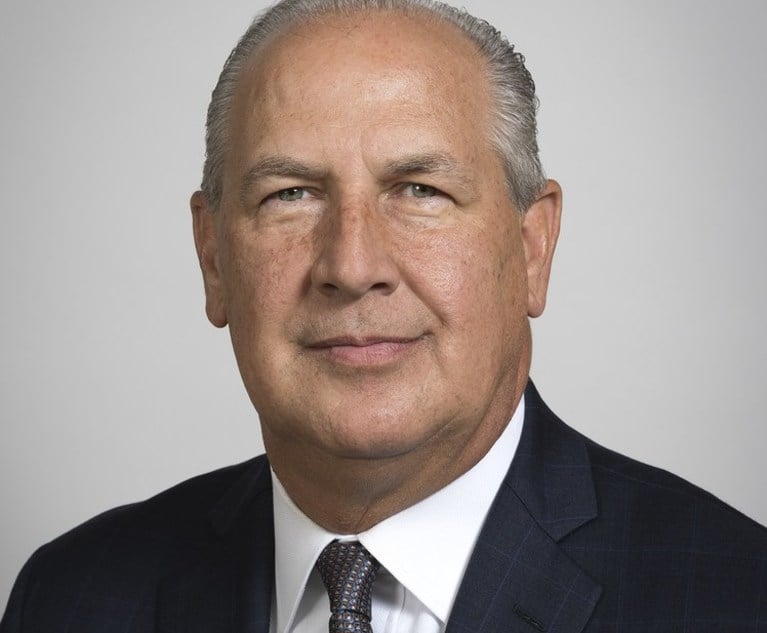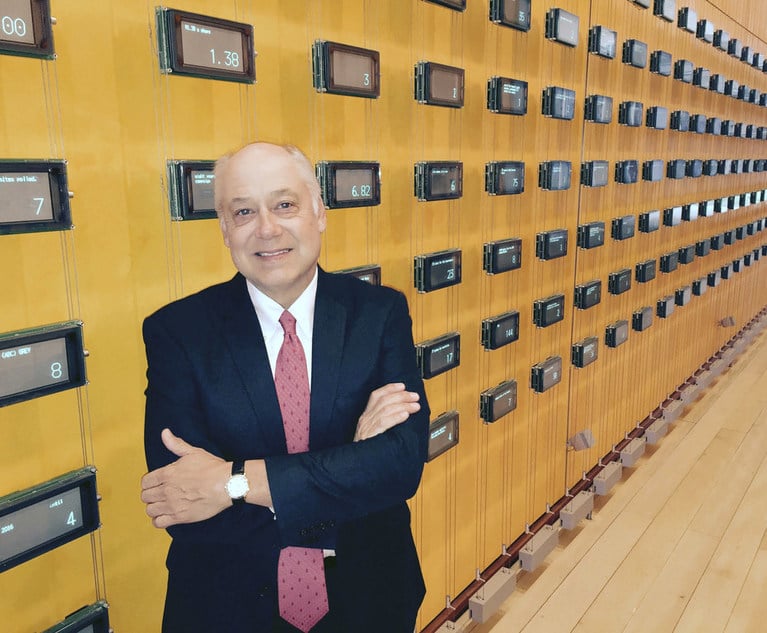'Bringing the Best Practices': Plaintiffs Firms Becoming Breeding Grounds for Legal Tech Ventures
"We haven't gone through that same revolution in law," the Northwestern University law professor said, comparing the legal profession to the medical field.
February 03, 2020 at 04:17 PM
9 minute read
 Photo: Alexander Supertramp/Shutterstock.com
Photo: Alexander Supertramp/Shutterstock.com
Editor's note: This is the second part of a series looking at the intersection of plaintiffs firms and emerging technologies.
Daniel Lieber and Jeff Bennett were both working as paralegals at a Philadelphia personal injury firm, getting ready to go to law school, when they recognized just how much data law firms handle on a daily basis. There are the hundreds of data points about the client calling in with a possible case, the billions of bytes stored in the firm's hard drives, the countless files being passed back and forth with each referral, or discovery dump.
Although the two had been gearing up for careers in the law, they decided to pivot instead to a career trying to bridge the gap between the latest technologies and the demands of a modern-day law firm. And so they founded the Philadelphia-based legal operations consulting company, MERR Consulting Group.
"We were inundated with a ton of information and data," Lieber said. "We came back and noticed there could be a marriage between these two experiences."
Plaintiffs firms, where leading attorneys often rely on experience and intuition rather than data analytics, are not known for being drivers of new and cutting-edge technologies, so it may come as a surprise to see a technology-focused startup growing out of a plaintiffs law firm. But the formation of MERR Consulting Group fits a trend, as plaintiffs firms over the past few years have proved to be fertile grounds for emerging legal tech ventures.
Daniel Linna, a professor at Northwestern's Pritzker School of Law, who focuses on innovation and technology, said there is plenty of space for emerging technologies, as the legal field is just beginning to familiarize itself with data analytics concepts.
"We haven't established ways to measure the quality of the work we do. To me there is a huge opportunity there. There's a tremendous amount of work that needs to be done," Linna said.
Linna likened the legal field to the medical field 150 years ago, before the practice was standardized and rigorous monitoring and analysis became a guiding principle. Typically, he said, attorneys across the board make all kinds of predictions at the outset of a case, but they rarely sit down afterward to do any analysis or evaluation of how those predictions worked out.
"We haven't gone through that same revolution in law," the Northwestern University law professor said, comparing the legal profession to the medical field.
Lawyers, especially those in the plaintiffs bar, have expressed some reluctance when it comes to using data analytics for making decisions about issues like how to litigate cases before a certain judge, or whether they should try to settle a case instead of trying to bring it before a jury. But, Linna said attorneys should really be asking themselves, not whether data analytics tools will provide all the answers, but whether they can help the firm perform better than it already is.
"You can't go from being data-driven to perfect models over night. There's a lot of work to get there," he said. "There's a ton of low-hanging fruit to get better at what you're doing."
Although many firm leaders in the plaintiffs bar are sticking with their gut when it comes to litigating cases, one area plaintiffs firms have been particularly interested in streamlining is their case management practices. As a result, some plaintiffs firms have helped fuel the growth of legal tech companies, providing unique answers to the bar's specific demands regarding case management.
One tech company that began in this market and has recently made strides to expand beyond the plaintiffs bar and into corporate counsel, nonprofit and government agencies is Litify, a practice management software company that spun out of the Florida-based personal injury firm Morgan & Morgan.
Reuven Moskowitz, Litify's chief executive officer, began creating the company three years ago while trying to develop a firm-specific platform for Morgan & Morgan, according to the company's chief revenue officer, Terry Dohrmann. As the platform expanded, the company separated into its own entity and has continued to grow with the help of investors like Esquire Bank, which provided a $2.5 million investment in May 2018, and Tiger Global Management, which provided a $50 million Series A investment in June. Dohrmann said Morgan & Morgan also remains one of Litify's biggest users and investors.
Moskowitz, Dohrmann said, recognized a gap in how law firms typically performed case intake and monitoring, and how other fields were tackling the issue.
"You have a very, very fragmented, disparate approach to technology. There are a bunch of systems that don't really talk to each other," Dohrmann said. "As a result, you don't get good reporting. You don't know what's really working for a firm."
The company, which is built on the Salesforce platform, sought to change that by providing a way for lawyers to detail client intake, store and access legal documents, and perform data analysis on cases and outcomes all in a single platform. Along with helping lawyers project the value of a case at the outset and streamline simple tasks like populating the calendar of events for the case, the program also bridges gaps across departments, like regularly tracking expenses for the billing.
According to Dohrmann, the company also continues to work with a wide swath of firms, analyzing their work flows so those niche and innovative techniques can be brought into the platform, often through its app exchange.
"We're bringing the best practices for processes and procedures that we're seeing," Dohrmann said.
One law firm that has been working with Litify and has also dedicated significant resources of its own to developing new legal technologies is Pond Lehocky, a Philadelphia-based plaintiffs' side workers' compensation firm.
According to the firm's chief strategy officer Shawn Lehocky, the firm leaders began discussing ways to revamp its case management platform about five years ago so it would have a single platform to handle all the needs from intake to billing. Litify, however, came out before the firm's platform came online, but, instead of developing a competing program, the firm decided to migrate to Litify, and Lehocky refocused his team on developing new legal technologies. Their efforts formalized into a joint venture between the firm and tech firm Brio called LegalOps.
The group, according to Lehocky, focuses on developing technologies that streamline the litigating process and make it so lawyers can handle every aspect of a case in just one screen. For example, the group recently came out with a medical records retrieval app for the Litify platform that sends out requests for medical documents and even notifies third-party document retrieval companies in a single interface, so attorneys only need to select the provider.
The tools, he said, are aimed at maximizing case values and providing efficiencies for lawyers so they can focus on the clients.
"We're using data analytics tools to get our clients to start talking and understanding everything that's wrong with them. We're talking about life, retirement plans, other medical ailments, where they're at financially, where they're at mentally," he said. "We want everyone to feel like they are in a small law firm, where the staff attorneys know it like the back of their hand. That's only available through data analytics."
Lehocky gave several reasons for why the plaintiffs bar has become a breeding ground for innovation. For one, the bar has unique needs, given its contingent fee business model and public-facing nature, and that puts these firms in the best position to tackle the issues. Plaintiffs firms, he said, can also be more flexible about bringing nonlawyers with tech mindsets into leadership roles.
Lehocky, whose uncle is firm founder Jerry Lehocky, said that before he focused on legal tech, he also planned to become a lawyer, but after working as a law clerk for the firm he was given the opportunity to get a masters of business administration degree in data analytics and form a new non-lawyer leadership role at the firm.
"Nonlawyers not being able to be equity partners at law firms have left out a lot of nonlawyer tech business minds," he said.
Another issue that makes the plaintiffs bar ripe for innovation is the fact that plaintiffs firms in particular have long resisted technology.
Bennett and Lieber, the co-founders of MERR Consulting Group, said that mentality can be frustrating, but it has also led to a lot of opportunity for tech-focused firms to get into this space.
Rather than developing platforms or programs to help with litigation or case management, Bennett and Lieber's group works with law firms to help them create better work flows and data capturing and storing processes. This entails a lot of observation of a firm's current practices, and wading through decades of fragmented case data, they said. The service, they said, is the first step in allowing a firm to leverage the "goldmine" of data it already stores.
The two said the services the group provides crosses all types of legal practices, and they plan to expand into the defense bar, but so far they have found a niche in the plaintiffs bar.
"We do understand lawyers have a great amount of experience and with a great amount of expertise comes high intuition," he said. "We'd be very far away from replacing information with experience. But it will supplement that intuition and make for much stronger decision-making."
Read Part 1 of the series:
'A Tidal Wave of Change': Plaintiffs Firms Are Tapping Data Analytics, but Some Are Still Reluctant
This content has been archived. It is available through our partners, LexisNexis® and Bloomberg Law.
To view this content, please continue to their sites.
Not a Lexis Subscriber?
Subscribe Now
Not a Bloomberg Law Subscriber?
Subscribe Now
NOT FOR REPRINT
© 2025 ALM Global, LLC, All Rights Reserved. Request academic re-use from www.copyright.com. All other uses, submit a request to [email protected]. For more information visit Asset & Logo Licensing.
You Might Like
View All
Kirkland Lands in Phila., but Rate Pressure May Limit the High-Flying Firm's Growth Prospects
5 minute read
Montgomery McCracken Touts 'Record' Financial Performance Despite Shrinking Head Count
6 minute read
Class Action Settlements Totaled $40B+ Three Years in a Row: 'We’re in a New Era'
5 minute readLaw Firms Mentioned
Trending Stories
- 1‘Catholic Charities v. Wisconsin Labor and Industry Review Commission’: Another Consequence of 'Hobby Lobby'?
- 2With DEI Rollbacks, Employment Lawyers See Potential For Targeting Corporate Commitment to Equality
- 3In-House Legal Network The L Suite Acquires Legal E-Learning Platform Luminate+
- 4In Police Shooting Case, Kavanaugh Bleeds Blue and Jackson ‘Very Very Confused’
- 5Trump RTO Mandates Won’t Disrupt Big Law Policies—But Client Expectations Might
Who Got The Work
J. Brugh Lower of Gibbons has entered an appearance for industrial equipment supplier Devco Corporation in a pending trademark infringement lawsuit. The suit, accusing the defendant of selling knock-off Graco products, was filed Dec. 18 in New Jersey District Court by Rivkin Radler on behalf of Graco Inc. and Graco Minnesota. The case, assigned to U.S. District Judge Zahid N. Quraishi, is 3:24-cv-11294, Graco Inc. et al v. Devco Corporation.
Who Got The Work
Rebecca Maller-Stein and Kent A. Yalowitz of Arnold & Porter Kaye Scholer have entered their appearances for Hanaco Venture Capital and its executives, Lior Prosor and David Frankel, in a pending securities lawsuit. The action, filed on Dec. 24 in New York Southern District Court by Zell, Aron & Co. on behalf of Goldeneye Advisors, accuses the defendants of negligently and fraudulently managing the plaintiff's $1 million investment. The case, assigned to U.S. District Judge Vernon S. Broderick, is 1:24-cv-09918, Goldeneye Advisors, LLC v. Hanaco Venture Capital, Ltd. et al.
Who Got The Work
Attorneys from A&O Shearman has stepped in as defense counsel for Toronto-Dominion Bank and other defendants in a pending securities class action. The suit, filed Dec. 11 in New York Southern District Court by Bleichmar Fonti & Auld, accuses the defendants of concealing the bank's 'pervasive' deficiencies in regards to its compliance with the Bank Secrecy Act and the quality of its anti-money laundering controls. The case, assigned to U.S. District Judge Arun Subramanian, is 1:24-cv-09445, Gonzalez v. The Toronto-Dominion Bank et al.
Who Got The Work
Crown Castle International, a Pennsylvania company providing shared communications infrastructure, has turned to Luke D. Wolf of Gordon Rees Scully Mansukhani to fend off a pending breach-of-contract lawsuit. The court action, filed Nov. 25 in Michigan Eastern District Court by Hooper Hathaway PC on behalf of The Town Residences LLC, accuses Crown Castle of failing to transfer approximately $30,000 in utility payments from T-Mobile in breach of a roof-top lease and assignment agreement. The case, assigned to U.S. District Judge Susan K. Declercq, is 2:24-cv-13131, The Town Residences LLC v. T-Mobile US, Inc. et al.
Who Got The Work
Wilfred P. Coronato and Daniel M. Schwartz of McCarter & English have stepped in as defense counsel to Electrolux Home Products Inc. in a pending product liability lawsuit. The court action, filed Nov. 26 in New York Eastern District Court by Poulos Lopiccolo PC and Nagel Rice LLP on behalf of David Stern, alleges that the defendant's refrigerators’ drawers and shelving repeatedly break and fall apart within months after purchase. The case, assigned to U.S. District Judge Joan M. Azrack, is 2:24-cv-08204, Stern v. Electrolux Home Products, Inc.






